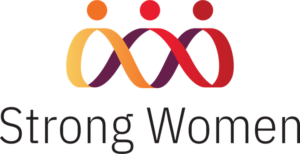Strong Women: Reducing the impact of intimate partner violence and substance use on women’s health.
Intimate Partner Violence and Substance Use
Women who experience intimate partner violence (IPV) are at significantly higher risk for substance use and mental health issues, which can often develop as a direct response to IPV. Ideally, these women would benefit from a dual approach that addresses both IPV and substance use simultaneously when accessing anti-violence and substance use services. However, integrated approaches are still quite rare.
The Centre of Excellence for Women’s Health is leading the creation and testing of Strong Women, an intervention for use in anti-violence and substance use services across Canada to support women who have experienced both intimate partner violence and substance use. The intervention is based on adaptations of existing workbooks and social support programs for women who have experienced intimate partner violence and/or alcohol and/or tobacco use and/or trauma and related concerns. The adapted workbook and social support curriculum are accompanied by a facilitator’s guide.
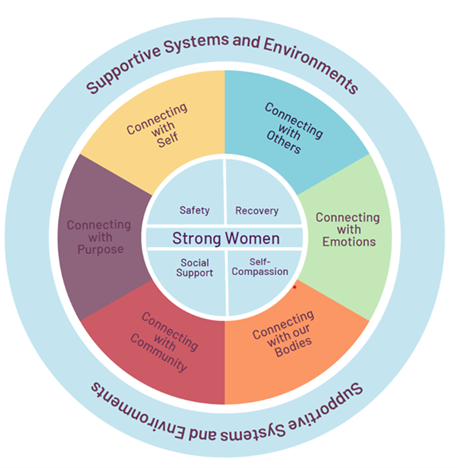
Strong Women is comprised of a virtual social support group and an accompanying workbook. In the Strong Women intervention, we are applying evidence-based principles and approaches from both the IPV and SU fields.
The 6-session virtual social support group aims to improve the mental and physical health of women who have experienced both IPV and alcohol and/or tobacco use in the last 24 months. The chapters cover a range of topics, including, values, relationships, emotions, body care, community connections, and finding purpose in recovery. This figure illustrates the components of each session.
This project involves pilot testing at two BC based agencies, and pan-Canadian testing at six anti-violence and substance use service providers in Alberta, Ontario and New Brunswick.
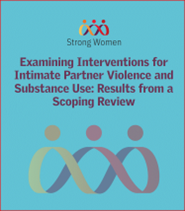
A scoping review has conducted to learn about and synthesized the evidence on interventions addressing intimate partner violence and substance use in the form of tobacco and or alcohol use, that informed the development of the Strong Women intervention. The scoping review identified alcohol as a commonly measured outcome of Substance Use and IPV interventions, but there was a lack of attention to tobacco in Substance Use treatment interventions (Brabete et al, 2024).
Key takeaways from the review that informed the development of the Strong Women intervention include:
- Use of trauma-informed approaches to foster a sense of safety, self-efficacy, self-determination, dignity, and personal control
- Use of Motivational Interviewing to foster empowerment, partnership, acceptance and compassion within groups
- Use of gender-responsive approaches including emotion-focused, somatic and nature-based, self-compassion, and empowerment-oriented approaches (Brabete et al., 2024).
For more information on the Strong Women project click here.
Reference
Brabete, A.C., Greaves, L., Poole, N., Wolfson, L., Whittaker, D., Cole, C. (2024). Examining Interventions for Intimate Partner Violence and Substance Use: Results from a Scoping Review. Centre of Excellence for Women’s Health. Vancouver, Canada. Strong-Women-Scoping-Review-Executive-Summary-May-28.pdf (cewh.ca)
For the past decade, researchers at the Centre of Excellence for Women’s Health have been producing resources about trauma-informed practice, including infographics, manuals, courses, booklets, guides, conversation starters, and more. The Trauma-informed Practice Guide remains popular 10 years after its development with the addictions field in BC. For more information about these resources, click here.

Community of Practice members
Nancy Poole
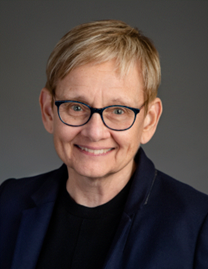
Role on the project: Principal Investigator, Strong Women
Dr. Poole is the Director of the Centre of Excellence for Women’s Health, and a leader on online participatory methods for knowledge generation and exchange on complex women’s health issues. She has co-led system change initiatives and co-developed toolkits, training curricula and guidelines on trauma-informed practice with organizations, institutions and governments across Canada. She has a strong commitment to working with Indigenous partners to incorporate strengths based and Indigenous wellness approaches in all health and substance use related initiatives. She received an Honorary Doctor of Laws Degree from the Justice Institute of BC in 2021 for her work in advancing women’s health including trauma-informed practice and the treatment of substance use and addiction. She will co-lead the development of and training for the workbook and social support intervention with onsite facilitators during the pilot and implementation phases and lead the development of the knowledge translation products and knowledge dissemination processes.
Dr. Lorraine Greaves

Role on the project: Principal Investigator, Strong Women
Dr. Greaves is the founding Executive Director of the Centre of Excellence for Women's Health and its Senior Investigator since 2009. She was previously the Director of the Centre for Research on Violence Against Women and Children in London ON. She is a medical sociologist and has worked in education, government, hospitals, and academia. She was appointed Chair of Health Canada’s Scientific Advisory Committee on Health Products for Women in 2019. She has received numerous awards for her work, including a Doctorate of the University from the University of Ottawa. She is leading the academic evidence review and the co-development of the workbook, social support curriculum, and facilitator’s guide. She has experience in creating social support group curricula, leading numerous national and international projects and has authored twelve books, 120 journal articles, and numerous reports, guidance documents, workbooks, toolkits and articles on sex and gender science, intimate partner violence and substance use.
Dr. Andreea Brabete
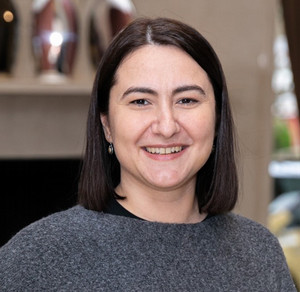
Role on the project: Project Coordinator, Strong Women
Dr. Brabete is a Research Associate at the Centre of Excellence for Women’s Health where she is involved in different projects related to women´s health and substance use. Andreea studied psychology and holds a PhD in Women´s Health earned at the Complutense University of Madrid (Spain). Her PhD dissertation focused on the impact of immigration on health status and its relationship with sex and gender related factors, acculturation, and personality. Her research interests include the interplay of intersections of social determinants of health in different populations, substance use, mental health, intimate partner violence, and psychometrical characteristics of questionnaires. She will conduct the scoping review, lead the drafting of the scoping review report, and support the development of the workbook and social support curriculum. She will oversee the data analysis and the focus groups, observe the intervention for fidelity at some sites, co-lead focus groups with facilitators and participants and prepare the report on the pilot and implementation findings.
Lindsay Wolfson, MPH

Lindsay Wolfson, MPH
Role on the project: Researcher, Strong Women
Lindsay is the Research Project Manager at the Centre of Excellence for Women’s Health and a MSW student at Wilfrid Laurier University. She holds a Master of Public Health, Social Inequities and Health, from Simon Fraser University. Lindsay is responsible for research and collaboration on projects relating to women’s substance use and stigma reduction, Fetal Alcohol Spectrum Disorder prevention, Indigenous health and wellness, and the integration of gender, trauma, culture, violence and equity-informed approaches into policy, research, and practice. She will coordinate activities with project partners, observe the intervention for fidelity at some of the sites, co-lead focus groups with facilitators and participants and support research and knowledge exchange activities.
